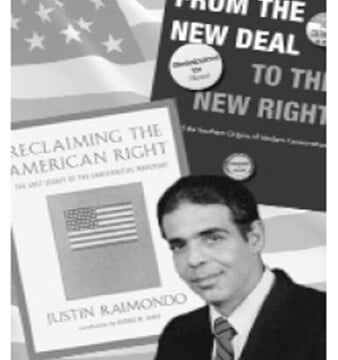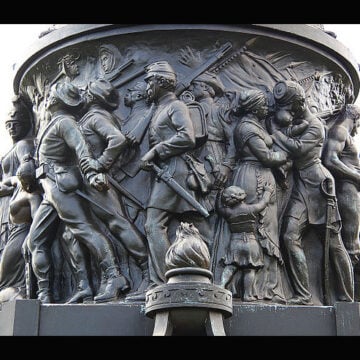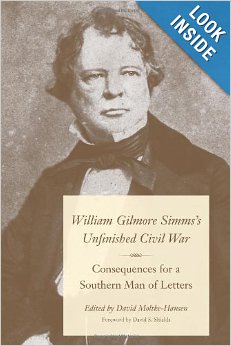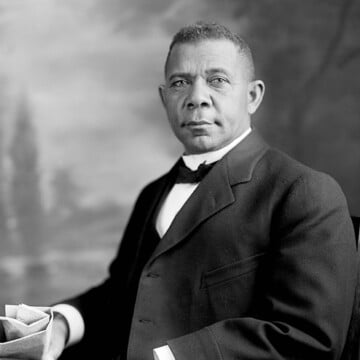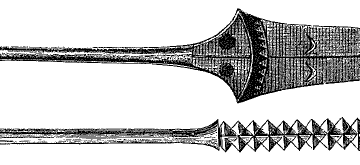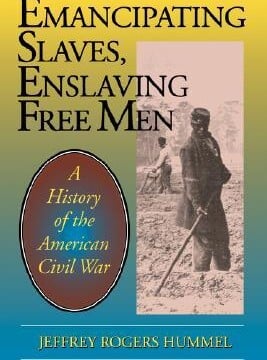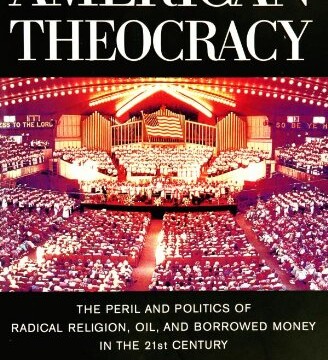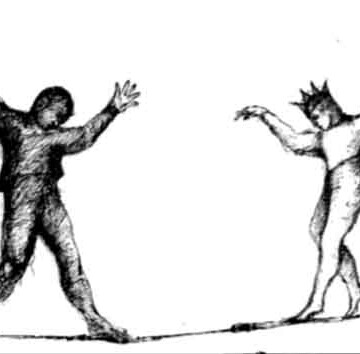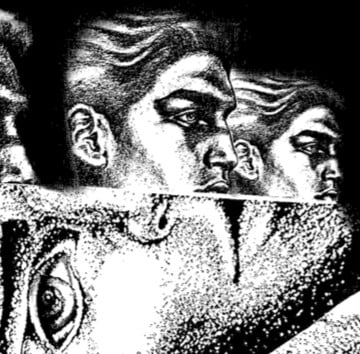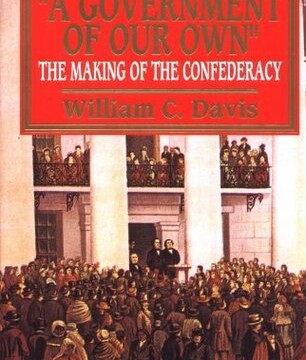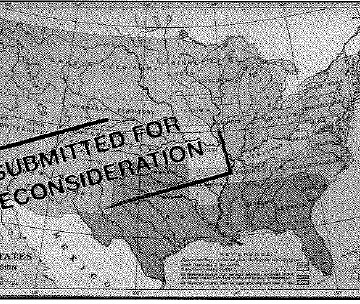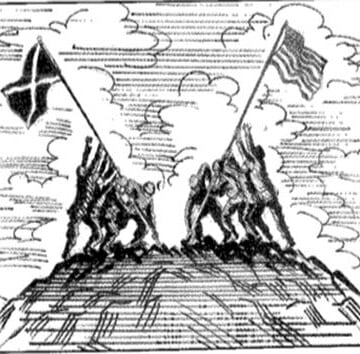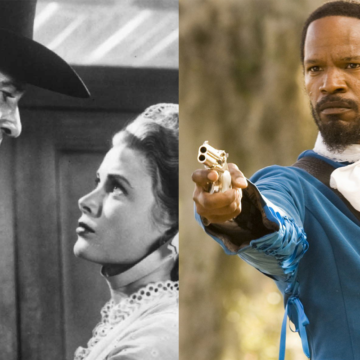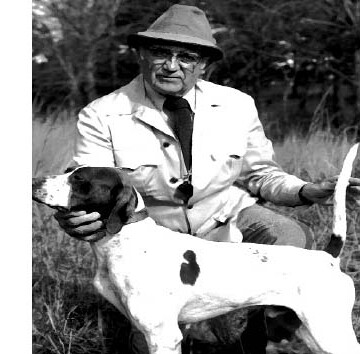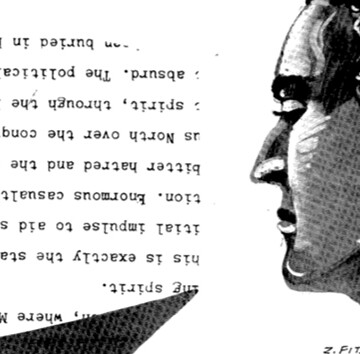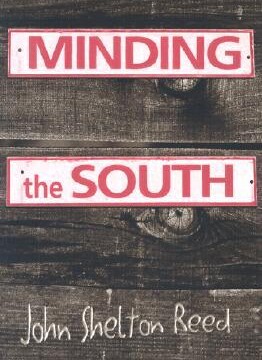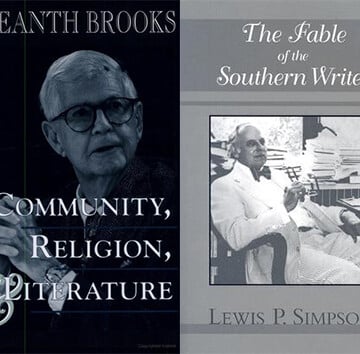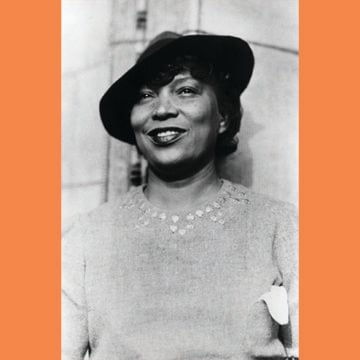“All great peoples are conservative; slow to believe in novelties; patient of much error in actualities; deeply and forever certain of the greatness that is in law, in custom once solemnly established, and now long recognized as just and final.” —Thomas Carlyle Both Justin Raimondo’s Reclaiming the American Right: The Lost Legacy of the Conservative...
2676 search results for: Southern%2525252525252525252525252525252BHeritage
Twelve Westerners?
“The Sahara of the Bozart,” more than anything else Mencken wrote about the South, won him the undying hatred of the former Confederacy and its spokesmen. The essay, which first appeared in 1917 as a newspaper column and was subsequently expanded for inclusion in the next volume of the Prejudices series, was attacked at the...
The Fate of Moses Jacob Ezekiel and His Memorial to the Confederate Dead
Just a few years ago, a monument to post-Civil War peace and reconciliation sculpted by one of America’s most gifted Jewish artists was universally acclaimed. Now a woke military commission and left-wing activists plan to destroy it.
Of Collard Greens and Kings
My godson was graduated from a Chicago high school last May. To my delight, he wanted to go to a Southern college. Unfortunately he picked Duke, which means that his idea of the South will probably come to include things like the rice diet, deconstructionism, Mercedes Marxism, and holistic therapy with crystals (“voodoo rocks,” my...
New England Against America
“The fiction of Mr. Simms gave indication, we repeat, of genius, and that of no common order. Had he been even a Yankee, this genius would have been rendered immediately manifest to his countrymen, but unhappily (perhaps) he was a Southerner. . . . His book, therefore, depended entirely upon its own intrinsic value and...
New England Against America
“The fiction of Mr. Simms gave indication, we repeat, of genius, and that of no common order. Had he been even a Yankee, this genius would have been rendered immediately manifest to his countrymen, but unhappily (perhaps) he was a Southerner…. His book, therefore, depended entirely upon its own intrinsic value and...
The Racists and the Flag
The Southern Baptist Convention finally had its Appomattox, surrendering the flag of its ancestors at its annual meeting of messengers (representative delegates) held in mid-June in St. Louis. Reportedly, an overwhelming majority of messengers voted in favor of Resolution 7, in which they determined to “call our brothers and sisters in Christ to discontinue the...
Reenacting the Civil War Is a Losing Strategy
I had to double-check recently that the Civil War actually did end in 1865. I wondered whether this was still the case after hearing Republican spokesmen and Conservative Inc. celebrities demonizing Robert E. Lee, Jefferson Davis, and other 19th century Southern leaders. American history seems to grow more hateful to our establishment conservatives as the...
The Discovery
The old saw tells us that all things come to those who wait. And what a joy it is to find Andrew Lytle, in his vigorous 80’s, receiving his just due, however late. The Richard Weaver Award by The Ingersoll Foundation, a generous grant by the Lyndhurst Foundation for his contribution to his Southern culture,...
Power, Legitimacy, and the 14th Amendment
The justification for the vast, intrusive, and coercive powers employed by the government of the United States against its citizens—from affirmative action to hate-crimes legislation, from multilingualism to multiculturalism, from Waco to Ruby Ridge—is the 14th Amendment to the U.S. Constitution adopted in 1868, or, more specifically, the authority conferred upon Washington, explicitly or implicitly,...
A New Venture
The Southern Classics Series is a new venture of J.S. Sanders and Company. John Stoll Sanders and his series editor M.E. Bradford are systematically resurrecting worthy titles that have disappeared from the pages of Books In Print. In so doing, they are making a valuable statement about the Southern tradition in American literature. I purposely...
The Mind of the South
That a tale should live, While temples perish! That a poet’s song Should keep its echoes fresh for all the hills That could not keep their cities! . . . So wrote William Gilmore Simms in his poem “The Lions of Mycenae” (1870). He was alluding to Aeschylus, Horace, and Homer, but was no doubt...
Remembering Booker T. Washington
When Booker T. Washington delivered his “Atlanta Compromise” speech in 1895 at the Cotton States and International Exposition, nearly 15 years after the founding of the Tuskegee Institute in Alabama, the effect was galvanizing. Frederick Douglass, until then the most prominent black American leader, had been in his grave only six months. Washington, now ascendant,...
The Good Kennedys
The Kennedys are an American institution. No, not the Massachusetts rabble, but the Louisiana Kennedys, James Ronald (of Mandeville) and Walter Donald (of Simsboro), self-described “Scotch-Irish crackers” and authors of The South Was Right! and Why Not Freedom! America’s Revolt Against Big Government, both available from Pelican Publishing in Gretna, Louisiana (phone number: 1-800-843-1724). Born...
Down Home—& Out to Lunch
James Wilcox: Modern Baptists; Dial Press; New York. Joan Williams: Pariah and Other Stories; Atlantic/Little, Brown; Boston. by Fred West First novels can be wonderful events, given the shrinking market for fiction these days. In general, creative writers have hit the bottom of the totem pole, as indicated by the endless string of credits flashed...
Reclaiming the American Story
Gods and Generals Produced and Directed by Ronald F. Maxwell Screenplay by Ronald F. Maxwell from Jeff Shaara’s book Released by Warner Bros. The war of 1861-65 is still the pivotal event of American history, despite all that has passed since. In the extent of mobilization, casualties, and material destruction on American soil, in the...
The Lincoln Legacy
“If the general government should persist in the measures now threatened, there must be war. It is painful to discover with what unconcern they speak of war, and threaten it. They seem not to know what its horrors are.” —Stonewall Jackson On balance, Jeffrey Rogers Hummel has written a provocative and much-needed book on what...
Republican Rapture
Kevin Phillips’ American Theocracy is divided into three parts held together, at times, only by the most tenuous of rhetorical threads. The first deals with the perilous politics of Big Oil and American imperial overreach; the third, with the looming threat to American prosperity represented by out-of-control national debt and what Phillips calls the “financialization...
The Writer and the Lawyers
If there are two vocations more opposite than, on the one hand, the starving but gifted poet, mystery and horror-story writer, and prolific essayist and, on the other, the obscenely rich, ambulance-chasing attorney, this writer does not know them. Yet these two are conjoined at birth. To understand this, one must know something about the...
When Is Enough Pandering Really Enough?
Having forced myself to listen to most of the Republican National Convention (RNC) orations in late August, I was struck by what my daughter, who had done such work professionally, characterized as the program’s “underlying marketing strategy.” The GOP’s advisers seem to have pitched their message at the demographics among whom Trump has had the least...
The First Arkansas Bill
“The Price of Empire is America’s soul and that price is too high.” —Senator J. William Fulbright August 8, 1967 The oily whoremaster in the White House dodged the draft thanks to another Arkansas Oxonian named Bill, but the debt remains unpaid. For the shirker is viciously conventional, as the ambitious young always are, while...
Divorce Italian Style
When I told friends that I was going to Italy to study the political situation there, the usual response was an amused puzzlement. Italian politics, I was informed, is like the Italian army: a grand opera performance of a comic opera plot. I am not so sure. Since the later Middle Ages, the Italians have...
Slavery, or Not
Joseph E. Fallon’s assertion (in “The North’s Southern Cash Cow,” Vital Signs, June) that the reason the South seceded “was the tariff, not slavery” is simply wrong. The loss of revenue from the American System of tariffs may have been one of the reasons the North waged war against the South. But the South’s main...
Locally Owned and Operated
How about three news items from a typical week in a Southern university town (Chapel Hill, May 1990), just to get the old motor warmed up after last month’s absence? A new law against urinating on the sidewalks resulted in a dozen arrests, nearly all of them beer-drinking students too pressed to wait or too...
What Cause Was Lost?
The War for Southern Independence reminds us of many things, not least of which that there were once many men who were willing to take up arms to defend what they believed to be their birthright as Americans. It was not by chance that the Great Seal of the new nation featured George Washington, for...
Federalism vs. Secession
“The powers not delegated to the United States by the Constitution, nor prohibited by it to the States, are reserved to the States respectively or to the people.” —The Tenth Amendment Following the passage of the national gun ban wrapped in pork, Representatives Gingrich and Gephardt congratulated each other for their bipartisan cooperation and remarked...
The Prophetic Voice of Donald Davidson
“Canst thou draw out leviathan with a hook?” —Job 41:1 No idea is more central to the American political tradition than that of limited government. As a nation we began with our commitment to the liberty of commonwealths, of communities, and of citizens. When we collectively rejected the remote, arbitrary, and potentially hostile power that,...
Words, Words, Words
An article I read lately informs me that the Southern accent is endangered: the “post-vocalic r,” the absence of which has heretofore characterized most Southerners’ speech, is creeping in, especially in middle-class circles, and especially among women. Ordinarily I stand up for schoolmarms—a genuinely endangered species, there-but if they’re behind this revolting development, I say...
Black Power and the 1619 Project
Radically recasting America’s formative years would be damaging enough, but The New York Times’ “1619 Project” is applying that same radical intellectual perspective on American history to contemporary social issues and problems. That intellectual perspective has its own history. It developed in earnest during the tumult and chaos of the Black Power radicalism of the...
Reattacking Leviathan
In 1989, Russell Kirk recalled browsing through the library at Michigan State College as an “earnest sophomore” over 50 years earlier. It was there that he happened upon Donald Davidson’s The Attack on Leviathan. “It was written eloquently,” Kirk notes, “and for me it made coherent the misgivings I had felt concerning the political notions...
The Emperor’s Tattoo
“A monarchy that’s tempered with republican equality.” Who would have thought, 100 years ago, that by the end of the American Century the great burning public issue would be the Confederate flag? Back in 1900, Americans were eager to put their quarrels behind them. Rebs and Yanks had fought side by side in Cuba, and...
The Virginia Cavalier
“We are Cavaliers,” novelist William Caruthers boasted, “that generous, fox-hunting, winedrinking, dueling and reckless race of men which gives so distinct a character to Virginians wherever they may be found.” If we look closely at the Cavalier, will we find the quintessential Virginian? “Cavalier” was originally an English term signifying political affiliation, not social status....
From High Noon to Django Unchained
Our new issue of Chronicles contains several essays that assess films that can be classified in some sense as “conservative,” or at least dealing with themes of interest to the political right. Several of those who participated in making these movies and whom we discuss in this issue, such as Russian filmmaker Nikita Mikhalkov, American...
Living the Good Life in the South
Havilah Babcock was a teacher who was once one of the best-known educators in South Carolina and a writer who had a national audience. Today, few remember him. This is partly because of the passage of time—Babcock died in 1964. It is more owing to changes in American life and literature. Babcock was a proud...
When Democracy Comes to Town
It was one of those political pundit panels on C-SPAN. Mona Charen, neoconservative columnist, was asked to sum up her experiences in the Kemp-for-President campaign in 1988. Miss Charen grew unwontedly misty-eyed: “The [democratic] process,” she sighed wistfully. “The process was so wonderful.” It is doubtful if any of the presidential candidates or their handlers...
Losing Federalism
Human liberty has two distinguishable but inseparable dimensions: the liberty of the individual to act according to his own reason and the corporate liberty of a moral community to pursue a vision of the good lived out in institutions and traditions that bind generations. These two dimensions are necessarily in tension. The individual’s autonomy can...
Buzzards and Dodos
George Core (Editor of the Sewanee Review) Talks With George Garrett About the Quarterlies Shortly following his appearance on a panel about book reviewing at the annual Miami Book Fair, this interview with George Core took place in a 15th-story hotel room high above downtown Miami, its boarded-up storefronts and decay, its winos and druggies...
Education for a Conquered Nation
Declining test scores. Illiterate, spiritless, and passive graduates who have little motivation to find a job or succeed. Youngsters with no skills to compete in the marketplace. This is the tragic record of American public education, after billions of dollars and 127 years of direct federal funding. The results seem more appropriate for a rebellious...
On Samuel Francis and the League of the South
Dr. Samuel Francis seems to think that those of us who hope to reform the American empire by devolution are suffering from an “infantile disorder” and pursuing a goal neither possible or desirable (Principalities & Powers, February). Then he turns around and admits that nothing else has worked. His only hope seems to be a...
Passing the Bottle
In the aftermath of a conference not long ago, a dozen of us spent a night in downtown Little Rock. (No, this wasn’t the Economic Summit. It was a gathering of poets, novelists, and essayists to discuss Southern autobiography, and the talk was a whole lot better.) All in all, I’m a little more cheerful...
Worrying the Southern Bone
Longtime readers of Chronicles are familiar with John Shelton Reed, who used to write a column for this magazine. Those less familiar may recall the occasional news story based on the latest intelligence-gathering done by the University of North Carolina’s Center for the Study of Southern Culture, which Professor Reed founded. Well-known among his fellow...
We Are Going, Gentlemen
“Poetry is the language of the state of crisis.” —Stéphane Mallarmé When Cleanth Brooks died at 87 in 1994, a great era of American literary criticism ended. Brooks had been one of John Crowe Ransom’s prize students at Vanderbilt, and when Ransom issued the call for a method of criticism of poetry that would not...
We Are Going, Gentlemen
From the August 1996 issue of Chronicles. “Poetry is the language of the state of crisis.” —Stéphane Mallarmé When Cleanth Brooks died at 87 in 1994, a great era of American literary criticism ended. Brooks had been one of John Crowe Ransom’s prize students at Vanderbilt, and when Ransom issued the call for a method...
Remembering Zora Neale Hurston
Zora Neale Hurston mocked the professional victims and race hustlers of her day and advocated for a positive, noncombative black identity. She was a woman of the right.
MSNBC Host: Donald Trump, Like Richard Nixon, Is Racist
Trump and Nixon promoted policies that disproportionately benefitted blacks, but this doesn’t stop Democrats from promulgating the fiction that Republicans are racists.
The Crossroads Merchants
“Standin’ at the crossroad I tried to flag a ride Didn’t nobody seem to know me everybody pass me by” —Robert Johnson I went to Charlotte in search of the New South and found it in a museum, the Levine Museum of the New South on 7th Street in Uptown Charlotte. Like most historical museums,...
Showdown at Gettysburg
Sitting through a showing of the recent film Gettysburg in a multiplex theater amid the abstract sprawl of suburban Yankeedom was somehow an unnerving experience. I don’t mean to say that the movie itself was off-putting or unsuccessful, though come to think of it, there were a few awkward moments here and there. No, the...
“American” Movies
” . . . the play’s the thing . . . “ —Hamlet, Prince of Denmark In a recent outing on this site I gave as an example of the emptiness of American culture the fact that American movies today are British Commonwealth dominated in directors, writers, and performers. I confess, I love movies, for...
Hanging With the Snarks: An Academic Memoir
There seemed to be little interest among audience members [at a scholarly meeting] in whether the ideas I had presented were true, only in whether their application would bring about results they liked. —Jason Jewell I used to have a running argument with a colleague, a great scholar now gathered to his fathers, during...
J. Strom Thurmond, R.I.P.
J. Strom Thurmond died on June 27, answering that last great Roll Call in the Sky at the age of 100, shortly after finishing out a half-century in the U.S. Senate. He won his first election before Bill Clinton and Junior Bush were born. He spent the last period of his life in his native...
